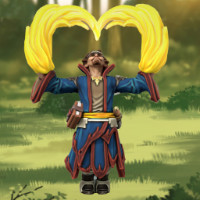I voted on this as it supports what I said a year or more ago.The Aaron has done a ton to keep Roll20 competitive in being more than a 'you can see the map and move your tokens from far away' game interface.I joined Roll20 a few years back as a player with years (too many) of experience playing
and game mastering tabletop RPGs for friends, family, and conventions. I love the tools and appreciate that R20's developers seem
to finally be doubling down on addressing some of the user requests that
have been out there for years, but I am finding that work slow in
coming while newer VTTs are breaking ground. I will confess that while I like Roll20 and have spent a lot of time (and cashy money) here, my players have been hearing me grumble about the increasing deficit of automated features in Roll20 that are becoming standards in other VTTs. On their request, we have dabbled in AboveVTT, Foundry, Fantasy Grounds, etc. making a list of what we like and what we don't. All too often, I come back to Roll20 and dig through the terribly organized forums to see if I can find an API or macro set that accomplishes SOME of the built-in features in the newer VTTs. Often times, I find an API written by The Aaron that did/does/or might come close (if I can figure out all the coding lingo and assumptions). While I like Roll20's ability to provide increasing game context when playing at a distance, or even enhancing game play at a real table top with visual aids, it still lacks a ton of the streamlining game mechanics that make a game a LOT more fun. Currently, I find Roll20 to be fine as a player (aside from compendium limits (6 per Pro GM, really??), search ability, and presentation of the compendiums), but as a DM/GM, it requires a heck ton more time to prepare games than it used to with tabletops. I find I have to have multiple web pages and apps up to manage the game, greatly increasing my stress. Where was that table/graphic/etc.? It reduces game time for players waiting for pure mechanical background fixes, token manipulations and load speeds (thank you for working on that!). As other VTTs are entering the market, they are adding a LOT of features to their
tabletops such as player-controlled doors, 2-way windows with lighting, built-in and proximity sound effects, animated spells/tech/effects/mapping, automated
combat, enhanced token modifications/tools/ map layers, etc that are core components, not arcane enhancements. It is becoming more
important that Roll20 keep up if they want to stay in the VTT game world. I
hearken back to TSR's AD&D Core Rules software in the late '90's.
The software allowed DM/GMs to focus more on the fun storytelling than
the mechanical game pieces, helping keep players more engaged during
game time. The Aaron's apps often do just that by streamlining mechanics and enhancing game play. It is clear that he has become intimately familiar with the code, so I have always wondered why many of his apps were not directly implemented at least as core options to 'one-click' add (not just for Pros) with supporting documents and tutorials from Roll20 to make it easy for non-coders to use. While I know that Roll20 wants to keep the application fairly game agnostic so that many systems can be played, I want to toss in a quick plea for more D&D support. It is still the single most widely played RPG in the world. So even if you create a separate instance of Roll20 that better supports D&D Beyond dynamics and specializes in making D&D dungeon mastering as easy as pie, Roll20 can support all the other games as well. It is like college sports. The big games (basketball, baseball, football, soccer) draw in the donor, ticket, and merchandise dollars to support funds and resources for fencing, golf, swimming, etc. So please consider hiring The Aaron and some of his fellow coders like Keith Curtis etc, (or at least buying and implementing some of their best used APIs to add to your core product) to enhance what your Roll20 team is doing. A caution: in an ever increasingly commoditized world, should someone at Roll20 decide that passing on purchase costs for enhancements like some VTTs do (marketplacing API-type additions) might generate some cash in pocket in the short-term, it will definitely cost Roll20's longevity as other VTTs make (what Roll20 currently considers 'optional enhancements') core features. After all, I do not want to have to repurchase all the
games, compendiums, and modules again unless it gets to the point that I
spend more of my game sessions frustrated by what Roll20 does NOT do
than what it does. That is a large part of what is keeping me now. Seriously, a character turning on a light source (candle, torch, flare, flashlight, Bat Signal ...) should not require a Pro account, coding and web design skills, etc. In conclusion, my thanks to the many coders who have created some of the tools that I and my players enjoy in Roll20. The Aaron, you and Keith are among the ones I appreciate the most. Thanks to those at Roll20 for moving ahead!






































